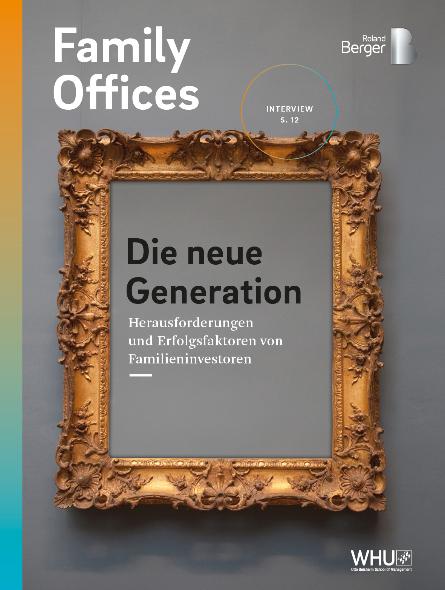Learn more about the recent developments in the Private Equity Industry, including the upcoming trends for 2021 and the market outlook for the rest of the year.


Family offices in transition: Challenges and success factors
By Justus Jandt
Family investors see increasing professionalism and a focus on direct investments
They are discreet and are successful in business. And they manage their assets themselves with the aim of diversifying and further increasing the family's wealth: The number of family offices, especially single family offices (SFOs), has been rising for years. SFOs currently number around 350-450 across Germany, Switzerland and Austria, and some 70% of them have been established in the years since 2000. At the same time, SFOs are becoming more professional and developing an increasingly institutional approach. Once the second generation takes control, that is when structures, processes and investment decisions are most likely to be revised and adjusted.

It is this development, coupled with the desire to remain entrepreneurial and the search for attractive returns, that lead many SFOs to shift their investment focus towards direct investments. To be successful in this asset class, a more institutional setup is required. A professional approach is essential for success in sale processes. The latest Roland Berger & WHU Family Office Study analyzes how SFOs differ from financial investors, what challenges they face and which success factors are key.
"Successful single family offices are constantly evolving their business model and we are seeing an increased focus on direct investments."
Entrepreneurial DNA is not the only difference
Some 65% of the more than 100 SFOs in the survey that have already sold their family business are making direct investments. This puts them in the market with established PE funds, making them new competitors. But they are fundamentally different to traditional financial investors.
One of the biggest differences is the source of the funds. SFOs invest their own assets, whereas PEs have to raise capital on the money markets and pay it back by a certain point in time. SFOs therefore have more flexibility to act and they can take the long-term view, as they are only answerable to family members. There are also differences in objectives: While PEs act primarily with a view to returns, SFOs are particularly keen on preserving capital for future generations and tend to prioritize non-financial objectives (such as ESG criteria, reputation). For them, long-term value creation is the key to success. That is also reflected in the investment holding period: With an average investment horizon of 19 years, SFOs commit to the companies they invest in for a much longer time than PE investors (5-7 years) and in many cases they hand over the portfolio to the next generation.
Professional structures and clear governance are crucial for success
By focusing on industries and sectors already known to the family from its business past, SFOs can apply their existing knowledge to select suitable targets and develop the companies going forward, simultaneously exploiting synergies with other portfolio companies. This can be crucial for success, especially when investing in family businesses. SFOs are familiar with the special characteristics of family-run companies and have the necessary sensitivity to handle them right.
However, SFOs also need clear governance structures in order to reconcile the various family interests and to be able to act with more independence from the family. Clear guidelines have to be laid down on how decisions are to be made and implemented, and explicit responsibility profiles need to be defined. This is particularly important when external directors are appointed, as it is what gives them the freedom to act flexibly and independently. Successful SFOs also use their family governance to ensure that all decisions are in line with the family's overall objectives. Involving the next generations in strategic and operational decision-making at an early stage is another important success factor to ensure a smooth handover.
In addition to this, the new focus on direct investments requires a higher degree of professionalism in order to be able to compete with established PE funds. However, the increasing institutionalization, greater asset diversification and larger asset base also brings greater complexity and thus ramps up the administrative effort and costs. Through our comprehensive consulting services, we support SFOs in activities such as asset reporting, legal and tax advice as well as the outsourcing of due diligence processes to external service providers.
Register now and download the entire study including several case studies. You will also receive regular insights into our investor support topics.

_person_144.png?v=1687234)




_person_320.png?v=1687234)
